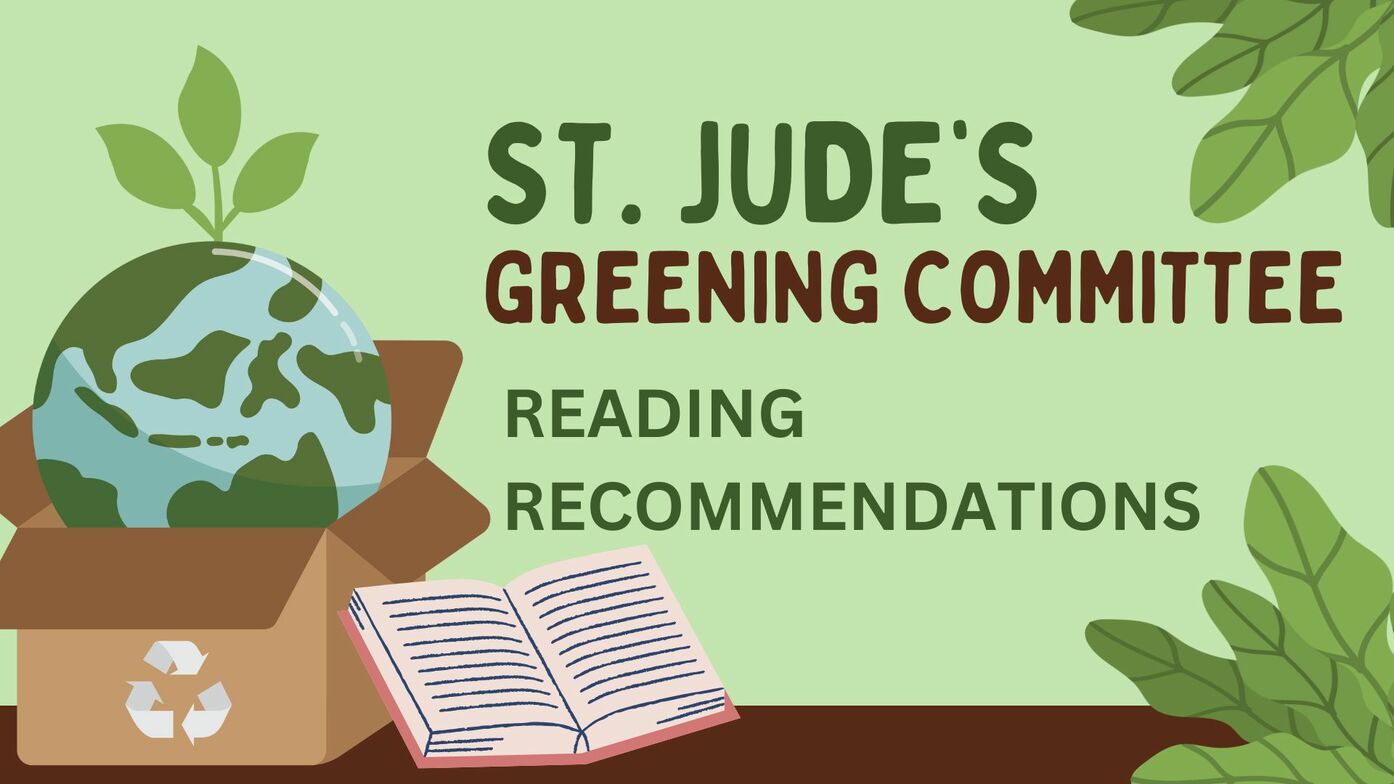A Commentary on 'How to Be a Climate Optimist' by Chris Turner

 Good morning! I’m Hamish Guthrie, Chair of St. Jude’s Greening Committee, where I work with Jenny le Riche, Sally McFadyen, Martha Denning and Anne Weeks. Our mandate on the Greening Committee is to work to improve the energy efficiency of this building. We conduct an ongoing energy audit, liaising with other committees to reduce the carbon we consume to heat and light this place, and run the appliances etc. efficiently. We’re excited about our results, and the way we are seeing St. Jude’s reducing the costs in these areas!
Good morning! I’m Hamish Guthrie, Chair of St. Jude’s Greening Committee, where I work with Jenny le Riche, Sally McFadyen, Martha Denning and Anne Weeks. Our mandate on the Greening Committee is to work to improve the energy efficiency of this building. We conduct an ongoing energy audit, liaising with other committees to reduce the carbon we consume to heat and light this place, and run the appliances etc. efficiently. We’re excited about our results, and the way we are seeing St. Jude’s reducing the costs in these areas!
This morning, I want to tell you about one of the books the Greening Committee has put in St. Jude’s library to enable everyone to learn more about the current climate crisis. Chris Turner’s book 'How to Be a Climate Optimist' is one of the best books I’ve read about the climate. Turner looks at the big question on everyone’s mind: Will we be able to reduce global carbon emissions enough to prevent the temperature of the globe from rising more than 1.5 degrees Celsius by the end of this century?
If you read only one book on the climate crisis, read this book. Let me tell you why it’s so excellent. Turner considers the whole world in his research. He takes you to the coral reefs off New Zealand, to China, Vietnam, to the Silicon Valley, to projects in Texas, Alberta, BC and Manitoba and to the Danish islands Samso and Aero that have reduced their carbon consumption to zero. This is partly a travel story. We learn that Denmark is already one of the most advanced countries in the race to zero carbon emissions. China is way ahead of everyone, with for example 36,000 miles of high speed electric trains built in the last 10 years. (How many such trains does Canada have? Does the US?) We learn fascinating things. The single most important climate energy development happened in Germany: it is research that helped make solar power as cheap as gas or oil. He considers the work of many other climate researchers whom you will have heard of: Jared Diamond, Naomi Klein and Tim Flannery. The person Bill Gates respects most of all the climate scientists in the world is professor Vaclav Smil who teaches at the U of Manitoba. Turner is an optimist about changes we’re making to save the climate, but he’s frank: he quotes one researcher who says “ [This] is the biggest, baddest collective action problem humanity’s ever faced.” Scientists and governments aren’t on the same page. He quotes a scientist Fatih Birol: ”There is a global disconnect between political statements, targets and what is happening in real life.” He reviews major conferences he attended: the Earth Summit in Rio, the Kyoto Protocol, and The Paris Accord. Turner is a great story teller and he’s often very funny about how useful, but sometimes utterly tedious some technical science conferences can be.
We now have all the resources we need to reach global carbon emissions to zero. But it’s not happening. Why not? The answer is complicated. Part of his answer looks at the work of two Yale U economists, Daniel Kahneman and Amos Tversky, and their theory of “loss aversion” which won them the Nobel Prize in economics People are averse to losing things they already know and love. The idea is very similar to something we all know: People don’t like change.
Bad stuff is happening. It seems we’re making changes only very slowly. Why then is Turner an optimist? I’ll give you part of his answer. First, so much good stuff is happening, and at such an overwhelmingly fast rate that it’s almost impossible to believe. China has built 36,000 miles of high speed energy efficient trains in the last 10 years. Electric vehicles barely existed 10 years ago. Now they are common. One reason so much is happening so fast is that there is so much money to be made in clean energy sources. Here’s what he says near the end of the book:
“Clean energy has attracted $4 trillion in investment since 2004… Wind and solar power are already the cheapest source of new power for two-thirds of the planet. In 2019, renewables provided 72 percent of all new electricity capacity to the world’s grids… [There is now] about 4 times as much renewable power in total as there was on earth in 2010… China has about 102 Hoover Dams of solar power alone, and the United States 35. … Germany has 25 solar Hoover dams.”
One of the American States with the most renewable energy sources is Texas, in the heart of oil country!
Two of Turner’s main ideas:
- Environmentalism is not about taking things away from people – doing away with cars for example. It’s about making cars better, more efficient, less polluting.
- The climate crisis is not an environmental problem. It’s partly environmental, but it’s also financial, political, social, and concerns urban planning too.
Read this book! Each one of us is a gambler in a global casino, betting on whether we can hold this planet to a temperature increase of 1.5 degrees. What’s Turner’s bet? He admits to profound worry. Read the book for his answer!
Hamish Guthrie, Chair
St. Jude’s Greening Committee